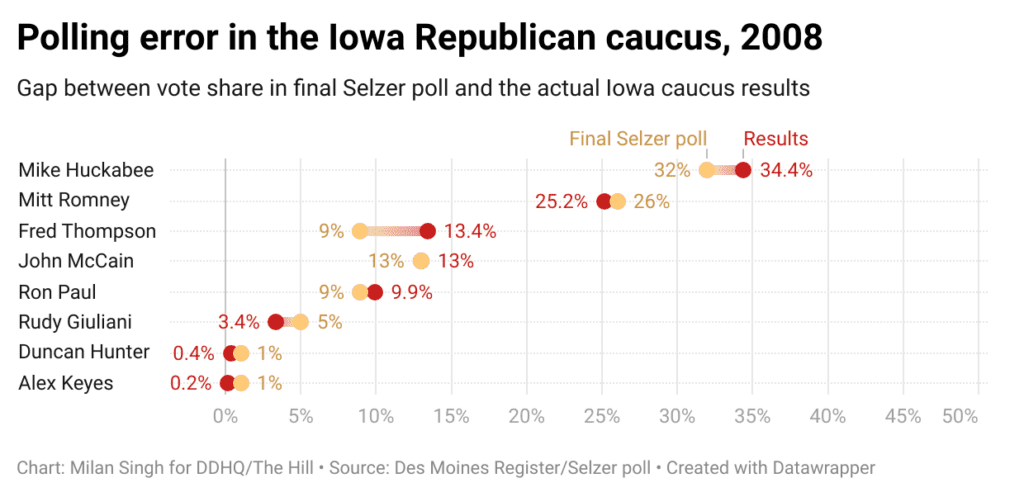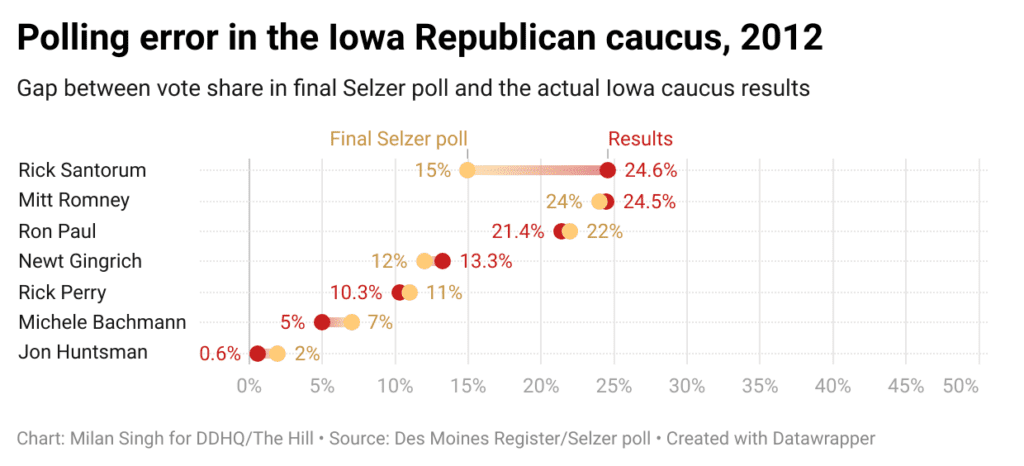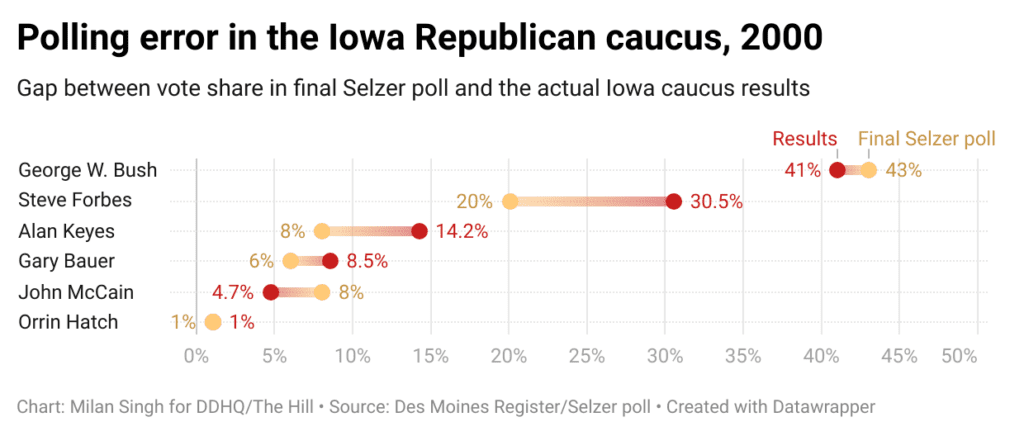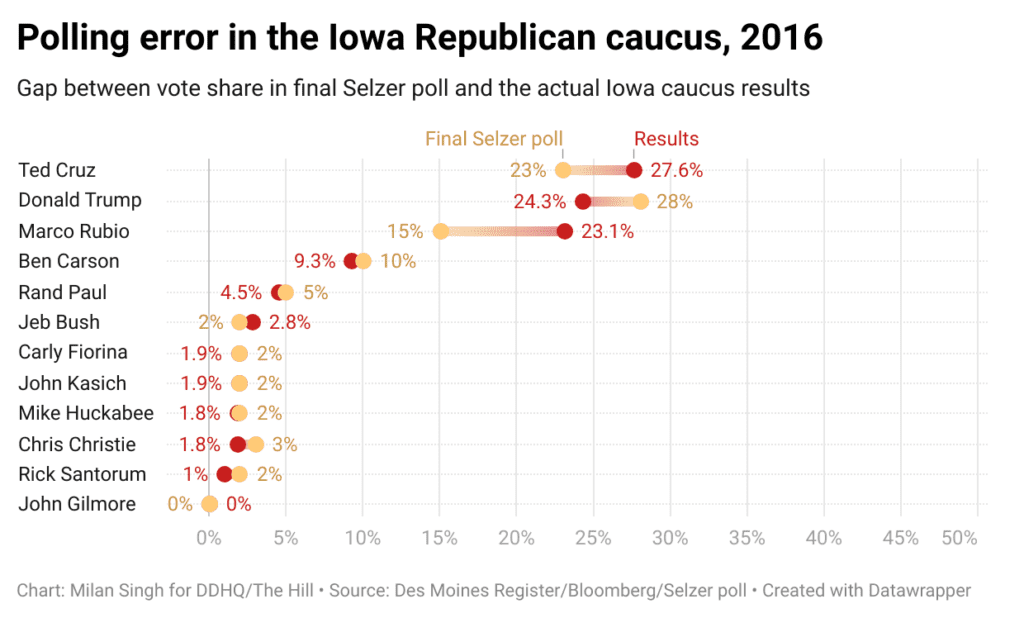Last night, the Republican presidential primary officially kicked off with the Iowa caucus. According to the Decision Desk HQ/The Hill polling average, Donald Trump held a 34.7-point lead, with 53 percent of the vote going into caucus night. Nikki Haley was polling at 18.3 percent; Ron DeSantis ’01 was at 15.9 percent; and Vivek Ramaswamy LAW ’13 was at 7.3 percent. Trump was widely expected to walk away with it, and he did. This time, the polls were accurate.
Last week, I spoke with a friend who was leaning toward Ramaswamy. He asked how accurate the polls tend to be in Iowa, so let’s take a look.
In the Hawkeye State, J. Ann Selzer’s polls are the gold standard. In 2020, most polls showed a close presidential race in Iowa: on Election Day, the FiveThirtyEight polling average had Trump up by 1.3 points. Selzer’s final survey had Trump up by 8 points; he ended up winning the state by 8.2 points. The final FiveThirtyEight average in 2016 had Trump up by 3.4 in Iowa; Seltzer’s final poll had him up by 7 points; he ended up winning the state by 9.4 points. You get the idea: she’s good at her job. The final Des Moines Register/Selzer poll this cycle, released on Saturday, had Trump at 48 percent, Haley at 20 percent, DeSantis at 16 percent and Ramaswamy at 8 percent.
But those were general elections. Caucuses, due to their unique — by which I mean stupid — mechanics and lower turnout, are more vulnerable to polling error, and most pollsters in Iowa aren’t as accurate as Selzer. So the question is: Could polling errors have shocked the nation on Tuesday night and propelled Haley, DeSantis or Ramaswamy to a surprise victory? Probably not.
In 2000, Selzer’s final poll nailed George W. Bush’s final vote share in Iowa but significantly underestimated Steve Forbes. Bush, the frontrunner, went on to easily win the Republican nomination; John McCain came in second nationally.
Selzer had a great year in 2008, nailing Mike Huckabee’s win, as well as Mitt Romney’s second-place finish. McCain went on to win the nomination, with Romney coming in second place nationally.
In the 2012 Republican caucuses, Selzer was very accurate — except for Rick Santorum. The final Des Moines Register survey had Santorum in fourth with 15 percent; He ended up edging out Romney to win the caucus. Romney beat Santorum, who dropped out after Super Tuesday, for the nomination.
In 2016, the last contested GOP caucus, Selzer’s final poll was close to the results for most candidates. But slightly overestimating Trump’s vote share coupled with undershooting Ted Cruz’s meant the survey projected the wrong overall winner. As you well know, Trump went on to win the nomination.
What’s the upshot of all of this? First, J. Ann Selzer is a pretty good pollster. Second, when it comes to the Iowa Republican caucuses, polls are generally accurate, and usually — but not always — give you a good idea of the candidates’ vote shares. True, it is possible for the polls to underestimate candidates, sometimes by a lot. And these misses can project the wrong winner. But by and large, polling will give you a good idea of who’s likely to finish where.
Let’s take the largest historical polling miss in Iowa — plus or minus 10 points — and apply it to this year’s caucuses, assuming the polls overestimated Trump and underestimated his opponents: Trump might have been at around 44 percent, Haley at 27 percent, DeSantis at 26 percent and Ramaswamy at 16 percent. That’s still a comfortable victory. And remember, we’re assuming the largest historical polling error in this hypothetical, all in the anti-Trump direction. When the results are all counted, the error this year will likely be smaller, and not directionally uniform.
Even if we make the most generous assumptions about polling error in Iowa, Trump’s opponents were almost certainly, as Chris Christie remarked last week, “smoked.” A second-place finish in Iowa and Christie dropping out of the race might’ve been enough to propel Haley to a surprise victory in New Hampshire. But almost half of Haley’s supporters in Iowa plan to vote for Biden in the general, and her net favorability rating with likely Republican caucus-goers has collapsed over the past few months, resulting in her third place finish last night. If Haley wins New Hampshire, that will be because lots of independents and Democrats end up voting in the Republican primary. I’ll change my party registration and vote for her on Super Tuesday, but it won’t be enough for her to beat Trump.
The GOP primary is for all intents and purposes over. So is the Democratic primary. Neither ever really began. Joe Biden is an incumbent president running for renomination; Trump functionally is, too. I would bet a large sum of money on the general election being a rematch. Seriously — I will give any interested readers 10:1 odds on Biden and Trump being their parties’ respective nominees. If the election was held today, Trump would probably win. But it’s a long time until November and a lot could change. So buckle up, buttercup.
MILAN SINGH is a sophomore in Pierson College. His column, “All politics is national,” runs fortnightly. Contact him at milan.singh.@yale.edu.











